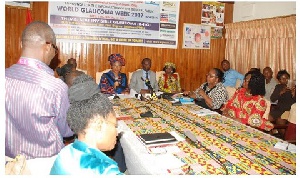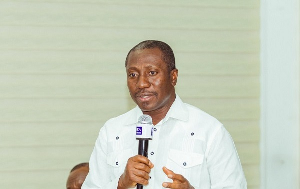An estimated 700,000 Ghanaians are living with glaucoma, a disease of the eye which has been described as the second largest cause of irreversible or incurable blindness globally.
Out of the number, 60,000 have already gone permanently blind.
In his welcome address at a ceremony to launch a week–long programme to mark the 2017 Glaucoma Week in Accra yesterday, the National President of the Glaucoma Association of Ghana, Mr Harrison Abutiate, said it was estimated that millions of Ghanaians had the condition but were not aware.
The week-long programme will be held on the theme, “Beat Invisible Glaucoma” and on the sub-theme, “Screen first degree relatives (FDRs)”.
It was launched by the association in collaboration with the Ministry of Health and other stakeholders.
Mr Abutiate said the eye disease, which had no symptoms or warning signs, could only be managed to prevent blindness if diagnosed early.
He, therefore, called on the public to go for frequent eye screening to ensure early detection of glaucoma.
He appealed to the public to go for eye screening at least once a year.
Raise awareness
Mr Abutiate explained that the association and its partners would focus on intensifying awareness, particularly on the need for the public to visit health centres frequently for eye screening, because blindness caused by the disease was irreversible.
“Glaucoma has no symptoms and, therefore, only an eye test can diagnose the disease but if the test is done at the time when the damage has already been caused, there is virtually little that can be done about it,” he said.
He said the best solution to eradicating the menace in Ghana was to empower the public with knowledge that would propel the needed attitudinal change, including regular eye screenings.
Mr Abutiate expressed gratitude to the Ministry of Health, the Ghana Health Service and some private sector institutions that had over the years supported the activities of the association.
“Awareness creation is a very demanding task which requires a lot of financial input. Although we are doing a lot, our activities are challenged with inadequate finances,” he said.
Mr Abutiate, therefore, appealed to both public and private sector organisations and philanthropists to support the association financially to boost its operations and enhance the national fight against the menace.
Glaucoma
In his presentation on an overview of the disease, the Director in charge of Operations at the Eyesight Universal and Ophthalmological Society of Ghana Glaucoma Group, Dr Boateng Wiafe, said there were different types of glaucoma but the severest type, primary open angle glaucoma, was prevalent in Ghana.
He defined glaucoma as an umbrella term encompassing several different eye diseases that damaged the eye’s optic nerve, the nerve that transferred visual information from the retina to the brain.
“Damage to the optic nerve can result in the loss of vision (often as blurriness in peripheral vision) and eventually blindness if left untreated,” he noted.
He submitted that the most common form of glaucoma popular in Ghana, the open-angle glaucoma, was caused by fluid-related eye pressure which builds up in the anterior chamber of the eye.
Dr Wiafe reiterated that the disease had no symptoms and no cure and, therefore, the only way to prevent it was to go for frequent eye screening to ensure early detection.
“When the condition is diagnosed in its early stages, it could be managed effectively to prevent blindness. However, people living with the condition will have to be on strict medication for life,” he said. He described that situation as far better than losing one’s sight permanently.
“Anyone can develop glaucoma, but people who are over the age of 40, people with a family history of glaucoma, people with diabetes and dark skinned persons are at the highest risk,” he mentioned.
In a remark read on his behalf to open the week-long activities, the Minister of Health, Mr Kwaku Agyemang-Manu, commended the Glaucoma Association of Ghana for its efforts at educating the public on the disease for the past decade.
“I am happy to note that through the awareness creation of the activities of the association, more people are becoming aware of the menace, which has become evident in the increase in hospital attendance by patients for glaucoma screening,” he said.
Health News of Thursday, 16 March 2017
Source: ultimatefmonline.com













